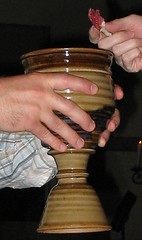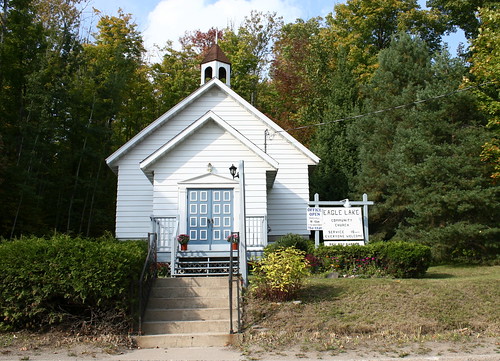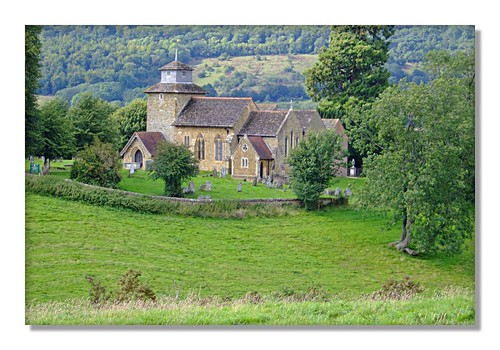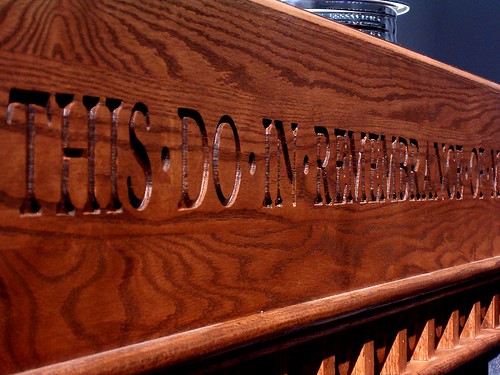THe Countrey Parson being to administer the Sacraments, is at a stand with himself, how or what behaviour to assume for so holy things. Especially at Communion times he is in a great confusion, as being not only to receive God, but to break, and administer him. Neither findes he any issue in this, but to throw himself down at the throne of grace, saying, Lord, thou knowest what thou didst, when thou appointedst it to be done thus; therefore doe thou fulfill what thou didst appoint; for thou art not only the feast, but the way to it. At Baptisme, being himselfe in white, he requires the presence of all, and Baptizeth not willingly, but on Sundayes, or great dayes. Hee admits no vaine or idle names, but such as are usuall and accustomed. Hee says that prayer with great devotion, where God is thanked for calling us to the knowledg of his grace, Baptisme being a blessing, that the world hath not the like. He willingly and cheerfully crosseth the child, and thinketh the Ceremony not onely innocent, but reverend. He instructeth the God-fathers, and God-mothers, that it is no complementall or light thing to sustain that place, but a great honour, and no less burden, as being done both in the presence of God, and his Saints, and by way of undertaking for a Christian soul. He adviseth all to call to minde their Baptism often; for if wise men have thought it the best way of preserving a state to reduce it to its principles by which it grew great; certainly, it is the safest course for Christians also to meditate on their Baptisme often (being the first step into their great and glorious calling) and upon what termes, and with what vowes they were Baptized. At the times of the Holy Communion, he first takes order with the Church- Wardens, that the elements be of the best, not cheape, or course, much lesse ill-tasted, or unwholsome. Secondly, hee considers and looks into the ignorance, or carelesness of his flock, and accordingly applies himselfe with Catechizings, and lively exhortations, not on the Sunday of the Communion only (for then it is too late) but the Sunday, or Sundayes before the Communion, or on the Eves of all those dayes. If there be any, who having not received yet, are to enter into this great work, he takes the more pains with them, that hee may lay the foundation of future Blessings. The time of every ones first receiving is not so much by yeers, as by understanding: particularly, the rule may be this: When any one can distinguish the Sacramentall from common bread, knowing the Institution, and the difference, hee ought to receive, of what age soever. Children and youths are usually deferred too long, under pretence of devotion to the Sacrament, but it is for want of Instruction; their understandings being ripe enough for ill things, and why not then for better? But Parents, and Masters should make hast in this, as to a great purchase for their children, and servants; which while they deferr, both sides suffer; the one in wanting many excitings of grace; the other, in being worse served and obeyed. The saying of the Catechism is necessary, but not enough; because to answer in form may still admit ignorance: but the Questions must be propounded loosely and wildely, and then the Answerer will discover what hee is. Thirdly, For the manner of receiving, as the Parson useth all reverence himself, so he administers to none but to the reverent. The Feast indeed requires sitting, because it is a Feast; but man’s unpreparednesse asks kneeling. Hee that comes to the Sacrament, hath the confidence of a Guest, and hee that kneels, confesseth himself an unworthy one, and therefore differs from other Feasters: but hee that sits, or lies, puts up to an Apostle: Contentiousnesse in a feast of Charity is more scandall then any posture. Fourthly, touching the frequency of the Communion, the Parson celebrates it, if not duly once a month, yet at least five or six times in the year; as, at Easter, Christmasse, Whitsuntide, afore and after Harvest, and the beginning of Lent. And this hee doth, not onely for the benefit of the work, but also for the discharge of the Church-wardens, who being to present all that receive not thrice a year; if there be but three Communions, neither can all the people so order their affairs as to receive just at those times, nor the Church-Wardens so well take notice who receive thrice, and who not. The thing that stands out to me most about this chapter is the sense of reverence a minister is to have about the sacrament. Dealing with holy things as part of regular work can numb us to the sacred. And in our already more casual age there seems to be a tendency to downplay things, even be flippant about the sacred. So I notice how Herbert seeks to simply approach the sacraments with an attitude of reverence. Notice it is not simply an appearance of reverence, a show to make the congregation feel somber; rather it is a genuine respect, stemming from humble reflection of the pastor’s own unworthiness to break bread and administer the washing.
The thing that stands out to me most about this chapter is the sense of reverence a minister is to have about the sacrament. Dealing with holy things as part of regular work can numb us to the sacred. And in our already more casual age there seems to be a tendency to downplay things, even be flippant about the sacred. So I notice how Herbert seeks to simply approach the sacraments with an attitude of reverence. Notice it is not simply an appearance of reverence, a show to make the congregation feel somber; rather it is a genuine respect, stemming from humble reflection of the pastor’s own unworthiness to break bread and administer the washing.
The other thing I notice is the way Herbert connects the sacraments to the day to day work of ministry: catechizing, discipling and purchasing the appropriate bread for communion. If the law requires church officers to report on parishioners who don’t take communion as often, then you need to make sure you offer the sacrament often enough that they can commune. This connection of the holiest moments with the most basic tasks of communal life reveals the earthiness of Christianity I think a lot of people miss. This earthiness goes against our natural taste for what is “spiritual” but it is the appropriate consequence of the incarnation. We have sacred moments, and while distinct they are never severed from “ordinary” life. We approach the holy with an attitude of reverence, but never of pretense. And we confidently, even “boldly pray as the children of God”; however, this confidence should never be a glib presumption, but rather an assurance in God’s mercy.
(Image of Chalice from hoyasmeg on flickr)








